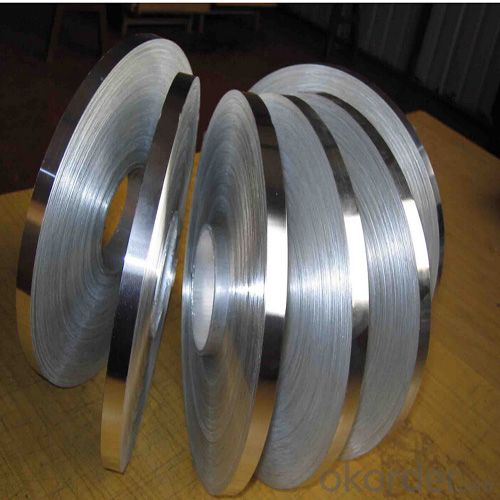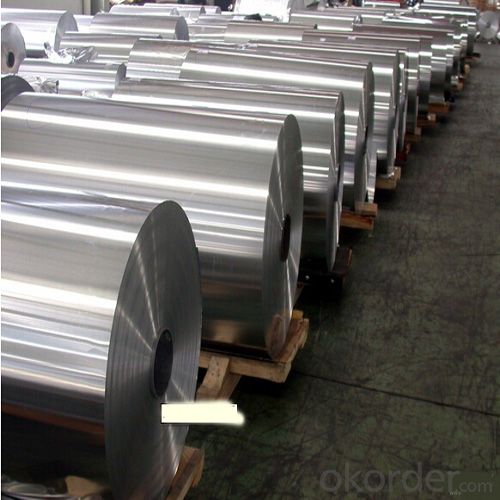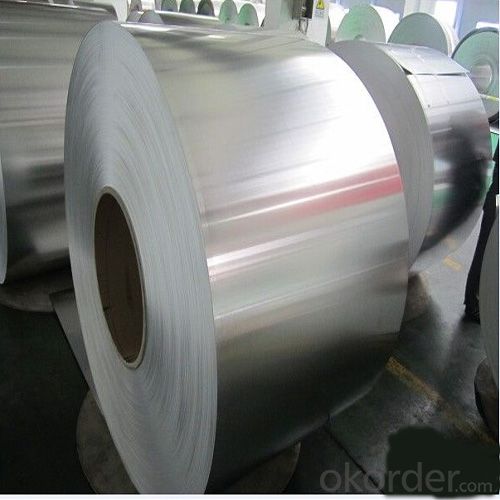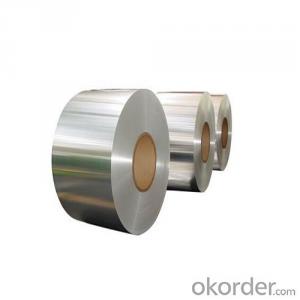Aluminum Fin Heat Exchanger Coils with High Quality
- Loading Port:
- Shanghai
- Payment Terms:
- TT OR LC
- Min Order Qty:
- 5 m.t.
- Supply Capability:
- 10000 m.t./month
OKorder Service Pledge
OKorder Financial Service
You Might Also Like
Item specifice
1.Structure of Aluminum Fin Heat Exchanger Coils Description:
Alloy Aluminium Plate 1200 is widely used in the strength requirements of the product. Products commonly used in signs, billboards, building exterior decoration, bus body, high factory wall decoration, kitchen sink, lamp, fan, electronic components, chemical apparatus, sheet processing, deep drawing or spinning hollow ware, welding parts, heat exchangers, Bell surface and plate, plates, kitchen utensils, accessories, safety equipment and other.
2.Main Features of Aluminum Fin Heat Exchanger Coils:
PVC Protect Film
Waterproof paper
High Quality
Competitive Price
3. Aluminum Fin Heat Exchanger Coils Images:



4. Aluminum Fin Heat Exchanger Coils Specification:
Standard | GB/T3190-2008, GB/T3880-2006, ASTM B209, JIS H4000-2006 .etc |
Thickness | 0.2-200mm aluminium 5050 H38 |
Width | 1250mm 1000mm or as your requirements |
Length | 3000mm 5800mm or as your requirements |
MOQ | 5 Ton |
Package | Standard export package, by wooden box or as require |
5.FAQ
Q1.How long have you been in this product?
A1:More than 10 years.
Q2. What's the minium quantity(MOQ)?
A2. 5 Metric tons
Q3. How long is shipping time?
A3. 7 (ready-made products)-25 days(OEM)
Q4. How do you guarantee the quality?
A4. 1. Cooperating and Exchaning experience with sevral quoted aluminum companies
2. Japanese and Swiss production line and skilled works (regular training and testing)
3. more than 10 years production experience.
Q5. Do you have after sale service?
A5. Yes. Any quality problem occurs within one year, pls take photoes,we will be responsible.
- Q:What are the common surface defects found in aluminum coils?
- Some common surface defects found in aluminum coils include: 1. Scratches: These are visible lines or marks on the surface of the coil that can be caused during handling, transportation, or processing. Scratches can impact the appearance and functionality of the aluminum coil. 2. Dents: Dents are depressions or deformations on the surface of the coil. They can occur due to mishandling or impact during transportation or storage. Dents can affect the structural integrity and aesthetics of the aluminum coil. 3. Corrosion: Aluminum is susceptible to corrosion, especially in environments with high levels of moisture or exposure to chemicals. Corrosion can appear as pitting, discoloration, or roughness on the surface of the coil. It can weaken the coil and compromise its performance. 4. Streaking: Streaks are thin lines or bands that appear on the surface of the coil, often caused by uneven coating or surface contamination. Streaking can affect the visual appeal of the aluminum coil and may indicate a problem with the manufacturing process. 5. Oxide spots: Oxide spots are small, discolored areas on the surface of the aluminum coil, caused by the formation of aluminum oxide. These spots can occur due to oxidation during processing or storage. While they do not typically affect the performance of the coil, they can be aesthetically undesirable. 6. Oil stains: Oil stains are greasy or oily marks on the surface of the aluminum coil, often caused by improper cleaning or handling. These stains can affect the adhesion of coatings or paints and may require additional cleaning or treatment. 7. Roll marks: Roll marks are elongated depressions or raised lines on the surface of the coil, caused by the rolling process during manufacturing. While roll marks are generally unavoidable, excessive or severe roll marks can impact the appearance and quality of the aluminum coil. It is important to note that proper quality control measures, handling, and storage practices can help minimize or prevent these surface defects in aluminum coils.
- Q:Can aluminum coils be used in the manufacturing of appliances?
- Indeed, the utilization of aluminum coils in appliance manufacturing is possible. Aluminum, renowned for its lightweight and robust nature, is frequently employed in the manufacturing sector due to its exceptional thermal conductivity and ability to resist corrosion. Such attributes render it suitable for an array of applications, including the creation of heating and cooling systems found in appliances like refrigerators, air conditioners, and ovens. In these appliances, aluminum coils are frequently employed to facilitate efficient heat transfer and guarantee optimal functionality. Furthermore, aluminum represents a sustainable option as it is eminently recyclable, thus presenting appliance manufacturers with an environmentally conscious choice.
- Q:Can aluminum coils be used in marine applications?
- Yes, aluminum coils can be used in marine applications. Aluminum is a corrosion-resistant metal that provides excellent durability and strength, making it suitable for various marine environments. It is commonly used in boat building, marine equipment, and other marine applications due to its lightweight nature and resistance to saltwater corrosion.
- Q:Its currently 3 AM so i can't check, but my question is:does aluminum rust slower/faster than other metals? I've basically had this bike for about 6 years, but only rid it once. Its been sitting in my backyard under a roof (safe from rain) for 6+ years. Is it safe to ride it? Also, bonus question: Does having a bike on campus make life 10x easier?
- Simple all alloy including aluminium turns to talcum powder which left will go black this is when the metal is oxidising. If the black is visible then scrap anything with it on. Have rescued many old bikes so things such as cables, tyres, tubes and your chain should be replaced as these usually suffer, if you are lucky these might still work. The chain will often freeze into a memory so won't turn, if not oiled may need hacksawed off. Most old bikes will reawaken with a few new or old replacement parts, also if will start to loosen with use so check it plus the bike will be desperately dry so to avoid component failure throw as much lubricant at it till it runs out and rejects it. The bike should only be sleeping so once wakened and sorted it will be as safe as you left it, though do check your brake blocks as these can split and perish. Steel parts can be replaced with alloy or treated with Kurust which gives rust a modern black component look. Have just woken a twenty five year old bike, once rebuilt it runs like a new bike plus is now safe as it has had various items modernised, something recommended for older bikes.
- Q:How do aluminum coils contribute to thermal insulation in buildings?
- Aluminum coils contribute to thermal insulation in buildings in several ways. Firstly, aluminum is an excellent conductor of heat, meaning it can effectively transfer heat away from the building's interior. This allows for efficient cooling during hot summer months, as the aluminum coils can absorb and dissipate the heat, preventing it from entering the building. Secondly, aluminum coils can be integrated into HVAC systems to regulate the temperature inside the building. By circulating cool air through the coils, the aluminum helps to maintain a comfortable temperature, reducing the need for excessive energy consumption. Additionally, aluminum coils can be used as part of an insulation system known as radiant barrier insulation. This involves placing reflective aluminum foil on the inside of walls, roofs, or attics, which helps to reflect radiant heat back towards its source. This prevents the transfer of heat into the building, keeping it cooler in the summer and reducing the need for air conditioning. Moreover, aluminum coils are lightweight and easy to install, making them a cost-effective choice for thermal insulation in buildings. They can be easily shaped and fitted into various spaces, ensuring optimal coverage and maximum thermal efficiency. Overall, aluminum coils play a crucial role in thermal insulation by effectively dissipating heat, regulating temperature, and reflecting radiant heat. Their versatility and efficiency make them a valuable component in creating energy-efficient and comfortable environments within buildings.
- Q:Are aluminum coils suitable for decorative purposes?
- Yes, aluminum coils are suitable for decorative purposes. They are lightweight, durable, and can be easily shaped and colored to create various decorative elements such as trim, edging, and accents. Additionally, aluminum coils are resistant to corrosion, making them ideal for both indoor and outdoor decorative applications.
- Q:I heard that one pound of aluminum pop tabs are worth more then a pound of aluminum pop cans. Is this true? Thank you.
- yup.. but not to you. You get the same ammount turning in the tabs as you would the whole can. They can process the tabs faster and more efficently due to lack of extra printed on them.
- Q:Automotive aluminum coil, using GB H22, what brand, what are the main ingredients?
- In the corresponding foreign brands for AlMg3, 5754 different heat treatment is the automobile manufacturing industry (car door, mould, seals), main materials used for canning industry
- Q:Are aluminum coils suitable for architectural roofing systems?
- Yes, aluminum coils are suitable for architectural roofing systems. Aluminum is lightweight, durable, and corrosion-resistant, making it an excellent choice for roofs. It can withstand harsh weather conditions, is easy to work with, and offers a range of design possibilities. Additionally, aluminum coils are available in a variety of colors and finishes, allowing for customization and enhancing the aesthetic appeal of architectural roofing systems.
- Q:Can aluminum coils be used in the production of aircraft fuel tanks?
- Aluminum coils, with their lightweight and durable nature, find application in the creation of aircraft fuel tanks. They are commonly employed in the aerospace industry due to their impressive strength-to-weight ratio. Furthermore, their corrosion-resistant properties make them an ideal choice for fuel tanks, as they can withstand the harsh conditions and chemicals present in aviation fuel. The utilization of aluminum coils enables efficient manufacturing processes, as they can be easily shaped and welded into the desired tank form. Moreover, aluminum possesses excellent thermal conductivity, aiding in the dissipation of heat generated during flight and preventing fuel overheating. In conclusion, aluminum coils are a fitting and extensively utilized material in the production of aircraft fuel tanks.
1. Manufacturer Overview |
|
|---|---|
| Location | |
| Year Established | |
| Annual Output Value | |
| Main Markets | |
| Company Certifications | |
2. Manufacturer Certificates |
|
|---|---|
| a) Certification Name | |
| Range | |
| Reference | |
| Validity Period | |
3. Manufacturer Capability |
|
|---|---|
| a)Trade Capacity | |
| Nearest Port | |
| Export Percentage | |
| No.of Employees in Trade Department | |
| Language Spoken: | |
| b)Factory Information | |
| Factory Size: | |
| No. of Production Lines | |
| Contract Manufacturing | |
| Product Price Range | |
Send your message to us
Aluminum Fin Heat Exchanger Coils with High Quality
- Loading Port:
- Shanghai
- Payment Terms:
- TT OR LC
- Min Order Qty:
- 5 m.t.
- Supply Capability:
- 10000 m.t./month
OKorder Service Pledge
OKorder Financial Service
Similar products
New products
Hot products
Hot Searches
Related keywords






























